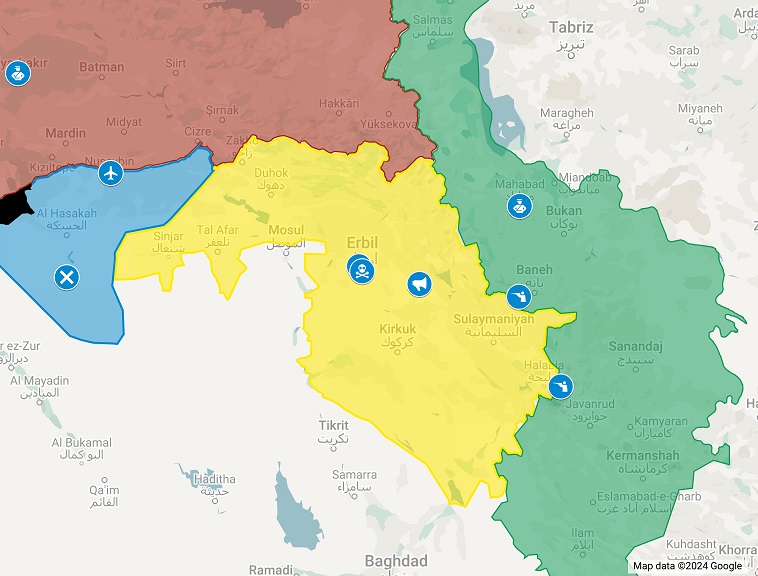1.4K
A weekly brief of events occurred in the Kurdistan regions of Iran, Iraq, Syria, and Turkey.
Iraq
- Iran’s Islamic Revolutionary Guard Corps claimed credit for several ballistic missile attacks on Erbil that killed at least four civilians and wounded 17 late Monday. The victims of Monday’s attack included a famous Kurdish businessman named Pishro Dizayee and his one-year-old daughter, alongside his business partner from Baghdad. Dizayee’s two sons and wife remain in critical condition. The IRGC declared it targeted “three Mossad bases” housing “anti-Iran groups.” Still, the Kurdistan Region Security Council (KRSC) asserted the attacks targeted civilian areas and called the IRGC’s declaration baseless. “This is a blatant violation of the sovereignty of the Kurdistan Region and Iraq, and the federal government and the international community must not remain silent about this crime,” said the KRSC. Kurdish leaders and parties condemned the attacks and considered it a violation of Iraq and Kurdistan’s sovereignty. On Tuesday, a large gathering of Kurds staged protests against the Iranian regime, holding up posters adorned with images of the victims. Simultaneously, at the World Economic Forum in Davos, US Secretary of State Tony Blinken held discussions with Masrour Barzani, the Prime Minister of the Kurdistan Regional Government (KRG). Barzani’s office conveyed that both the US and President Joe Biden perceive these attacks as a “serious threat.” They are committed to taking “necessary measures” to uphold regional security and stability. The missile attacks did not specifically target the US presence. However, one-way drones of the Iranian-backed Iraqi militias, directed towards Erbil airport, aimed at a US facility, resulted in no reported casualties.
- Pentagon Press Secretary Maj. Gen. Pat Ryder responded to Iranian-backed parties’ efforts to expel U.S. forces from Iraq by stating U.S. personnel are focusing on the anti-ISIS (Da’esh) mission and are in the country at the invitation of the Iraqi government. Iraqi Prime Minister Mohammed Shia al Sudani told Reuters the Iraqi government is seeking a quick U.S. exit but has not set a deadline for such a withdrawal yet. That said, Iraqi Minister of Foreign Affairs Fuad Hussein told al Arabiya that Iraq does not want to create a “chaotic situation regarding its relations with Washington” and emphasized the importance of “internal preparation before the start of negotiations.”
Iran
- Iranian authorities executed seven Kurds in Karaj prison on “drug” charges in one week, according to the Hengaw Organization for Human Rights. Another execution was reported on Tuesday, bringing the total number of Kurdish executions in 2024 to twenty. Simultaneously, the Iranian regime continued its crackdown on activists and civilians, detaining several Kurds in Mehabad, Piranshahr, Bokan, Baneh, Sardasht, Ilam, and Dewalan. At the same time, two Kurdish men died under torture in prison after months of detention, identified as Iman Hassanwanad and Paiman Abdi. Separately, the regime’s border guards and the IRGC wounded at least 18 Kurdish border porters (kolbar) and killed two in the bloodiest week of 2024, near Nowsud and Baneh.”
- Iranian Kurdish opposition parties condemned the recent rocket attacks on the Kurdistan Region by the IRGC, labeling them as acts of terrorism. The Democratic Party of Iranian Kurdistan (KDPI) attributed the attacks to the IRGC, alleging that they were carried out in response to the IRGC’s losses in Syria. Abdullah Mohatdi, the leader of the Komala Party of Iranian Kurdistan, questioned why the IRGC has not been designated as a terrorist organization by the world despite such actions. Both parties have experienced similar attacks in the Kurdistan region in 2018 and 2023.
Syria
- Turkish warplanes and drones targeted the infrastructure of the Autonomous Administration of North and East Syria (AANES) 73 times on January 12, wounding at least six civilians and cutting power to nearly 2 million residents. The AANES announced the strikes disabled seven oil refineries and seven power plants, destroyed five checkpoints manned by the Internal Security Forces (Asayesh), and damaged 45 other facilities. The AANES also said Turkey has been committing war crimes and crimes against humanity in northern Syria for years. The Syrian Democratic Forces (SDF) refuted Turkish claims that SDF personnel were killed in the strikes and called the attacks a “systematic destruction of basic service institutions and the deliberate targeting of the necessities of life for millions of people.” The attacks started after Turkish Minister of National Defense Yaşar Güler announced nine Turkish soldiers in Iraqi Kurdistan were killed by the Kurdistan Workers’ Party (PKK). Separately, Iranian-backed militias claimed responsibility for several additional attacks on facilities housing U.S. personnel in Syria. On January 12, the SDF said it seized “platforms for rockets and mortars” that belonged to “terrorist groups” plotting to attack the SDF, U.S. forces, and civilians.
Turkey
- The Turkish government detained 165 people across the country, with police raids taking place in various locations, including the Kurdish province of Diyarbakir (Amed) and Istanbul. A significant number of those detained are affiliated with the Pro-Kurdish Dem Party, and many of them face charges related to their social media posts critical of the government. Concurrently, as part of preparations for the upcoming local elections, leaders of the Dem Party held discussions with Turkey’s primary opposition group, the People’s Republic Party (CHP). In a statement issued by the Dem Party’s leaders, they firmly opposed the government’s policy of appointing trustees to replace elected mayors. The party urged all political parties and civil organizations to collaborate in safeguarding the collective future of the country. Notably, the municipal elections in Turkey are scheduled for March 31.

